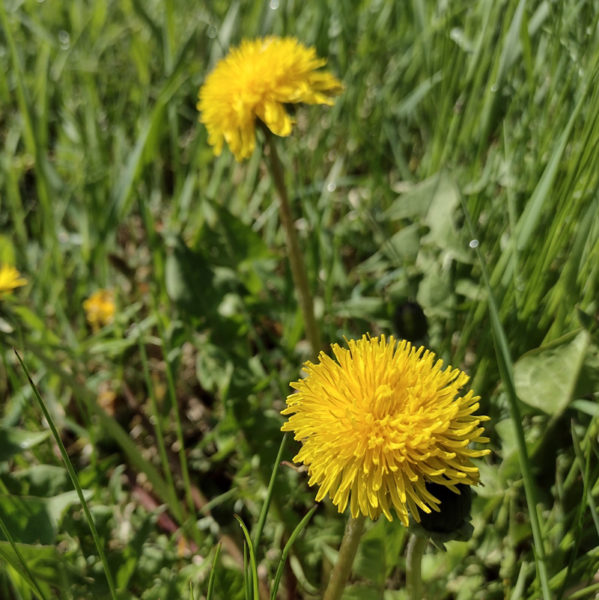
Some of the first dandelions of the year. (Photo courtesy Leifa Gordon)
By now, most of us are aware of the No-Mow May movement. This initiative allows for our yards to provide essential habitat and pollen for our early-season pollinators (like bees) by keeping them unmown until June.
Appleton, Wis. was the first U.S. town to officially participate in the movement after it spread from the United Kingdom, and other states like Maine have followed suit. Bigger towns in Maine such as Portland and Rockland are encouraging No-Mow May, and individuals across the state have been participating for years.
I know we all get excited when we see the first blooms of spring, and so do the bees! Avoiding the lawn mower in the early part of spring allows flowers like dandelions, clovers, and violets to grow and spread, which in turn supports our crucial pollinators.
Some folks have had a hard time getting on board with this idea. You like a tidy yard? I get it. One of my favorite chores is mowing the lawn. Worried about the ticks having more habitat where your family might be hanging out? I get that too. I think about this myself as I play with my own dog in the grass. However, with some flexible thinking, you can still participate without letting your yard go completely rogue.
Thinking about ticks? You could mow certain sections, being careful to avoid the perennial flowers that attract and support pollinators. You can add white clover, creeping thyme, and low-growing flowers if you want to lessen tall grasses but still support the effort.
Worried about waiting a whole month and not being able to get through the tall grass? Simply mowing less, especially when the pollinators first emerge, can be beneficial, too!
Concerned about what your neighbors will think? Put up a little sign letting passersby know what is happening and maybe inspire them to do the same.
Can’t make the switch to no-mow for whatever reason or don’t have a yard? Try designating some of your outside space to a pollinator’s garden or planting native plants in containers. This can also attract pollinators and support these conservation efforts.
While there are no hard and fast rules to No-Mow May, one thing we all should try to avoid is using pesticides. These products can negatively impact the pollinators, other wildlife, and our environment as a whole.
Our first pollinators of spring are small but mighty and serve a vital role in our ecosystem. In other words, we need them for survival. Consider showing them some love with No-Mow May, however that might work for you.






